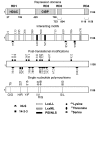The nuclear receptor transcriptional coregulator RIP140
- PMID: 17088940
- PMCID: PMC1630689
- DOI: 10.1621/nrs.04024
The nuclear receptor transcriptional coregulator RIP140
Abstract
The nuclear receptor superfamily comprises ligand-regulated transcription factors that control various developmental and physiological pathways. These receptors share a common modular structure and regulate gene expression through the recruitment of a large set of coregulatory proteins. These transcription cofactors regulate, either positively or negatively, chromatin structure and transcription initiation. One of the first proteins to be identified as a hormone-recruited cofactor was RIP140. Despite its recruitment by agonist-liganded receptors, RIP140 exhibits a strong transcriptional repressive activity which involves several inhibitory domains and different effectors. Interestingly, the RIP140 gene, located on chromosome 21 in humans, is finely regulated at the transcriptional level by various nuclear receptors. In addition, the protein undergoes several post-translational modifications which control its repressive activity. Finally, experiments performed in mice devoid of the RIP140 gene indicate that this transcriptional cofactor is essential for female fertility and energy homeostasis. RIP140 therefore appears to be an important modulator of nuclear receptor activity which could play major roles in physiological processes and hormone-dependent diseases.
Figures

References
-
- Albers M., Kranz H., Kober I., Kaiser C., Klink M., Suckow J., Kern R., Koegl M. Automated yeast two-hybrid screening for nuclear receptor-interacting proteins. Mol Cell Proteomics. 2005;4:205–13. - PubMed
-
- Augereau P., Badia E., Fuentes M., Rabenoelina F., Corniou M., Derocq D., Balaguer P., Cavailles V. Transcriptional regulation of the human NRIP1/RIP140 gene by estrogen is modulated by dioxin signalling. Mol Pharmacol. 2006;69:1338–46. - PubMed
-
- Baldus C. D., Liyanarachchi S., Mrozek K., Auer H., Tanner S. M., Guimond M., Ruppert A. S., Mohamed N., Davuluri R. V., Caligiuri M. A., Bloomfield C. D., de la Chapelle A. Acute myeloid leukemia with complex karyotypes and abnormal chromosome 21: Amplification discloses overexpression of APP, ETS2, and ERG genes. Proc Natl Acad Sci U S A. 2004;101:3915–20. - PMC - PubMed
LinkOut - more resources
Full Text Sources

